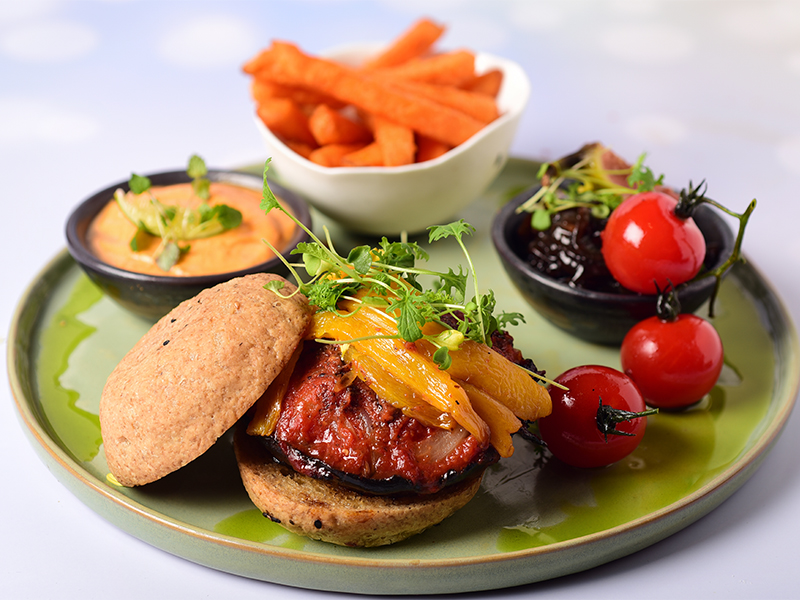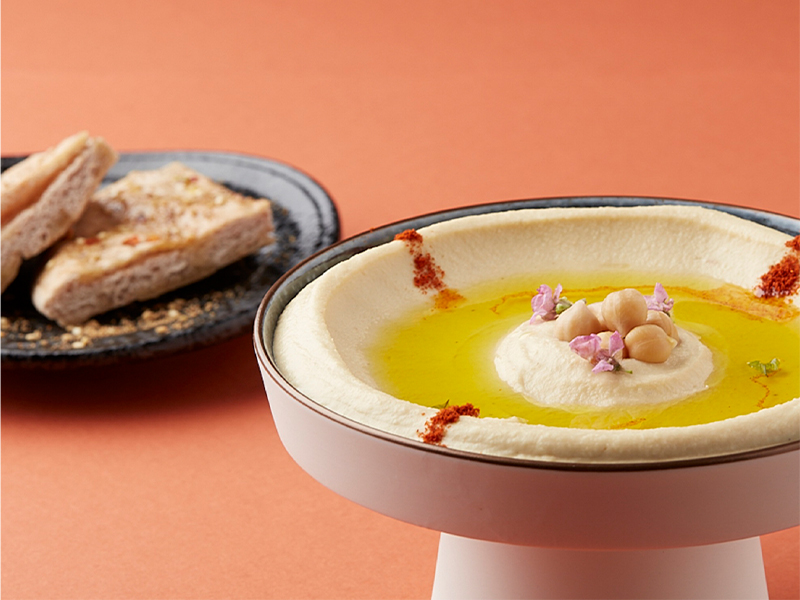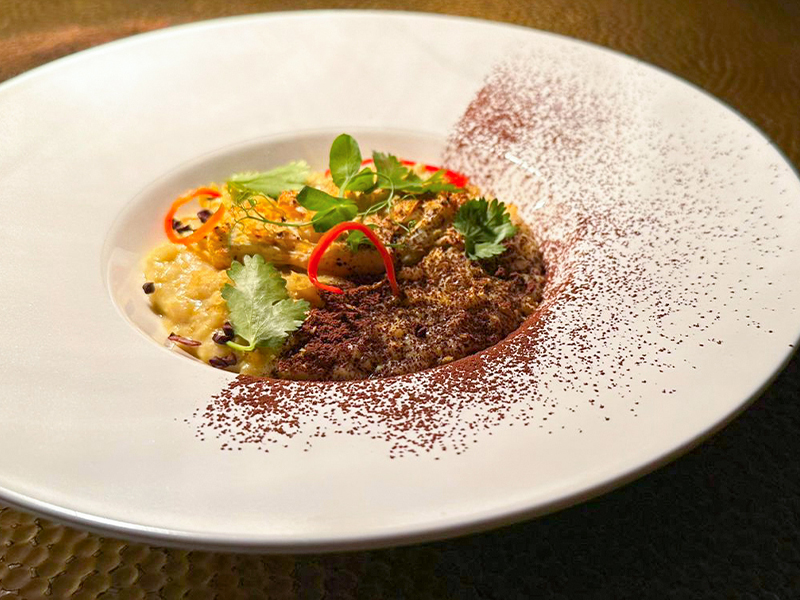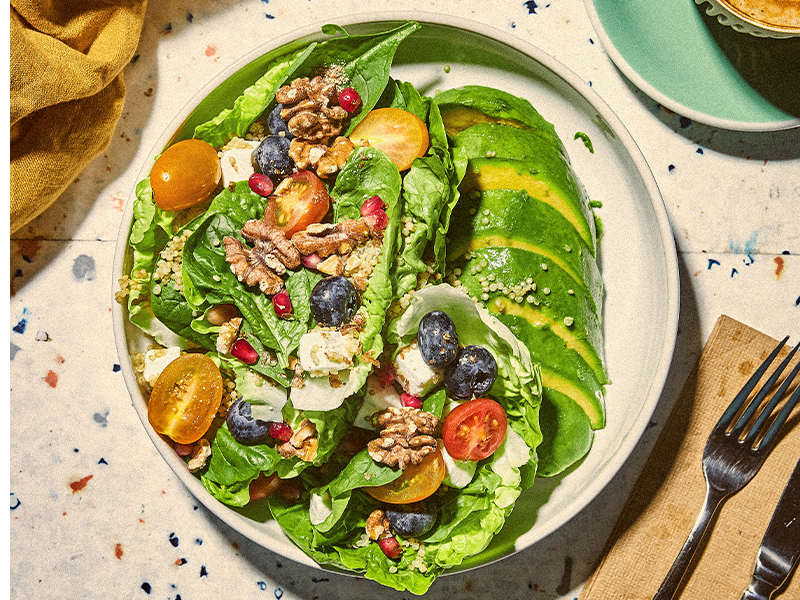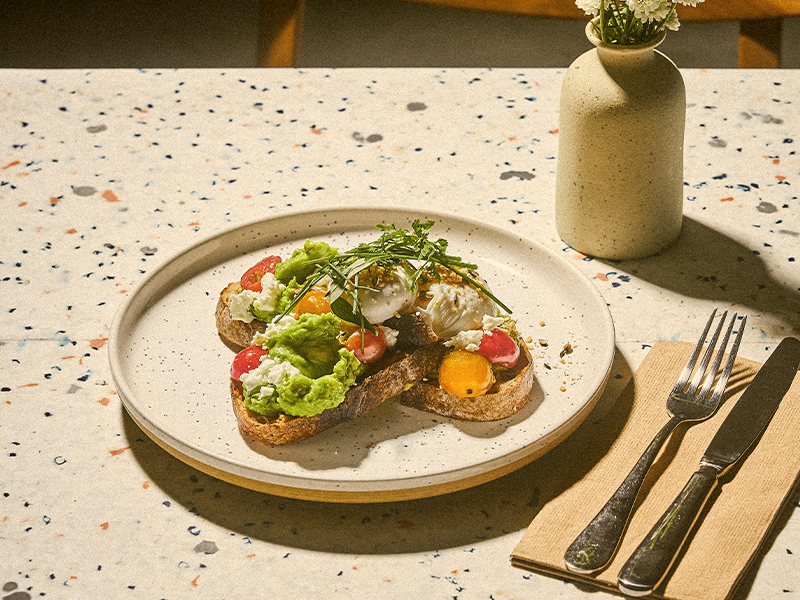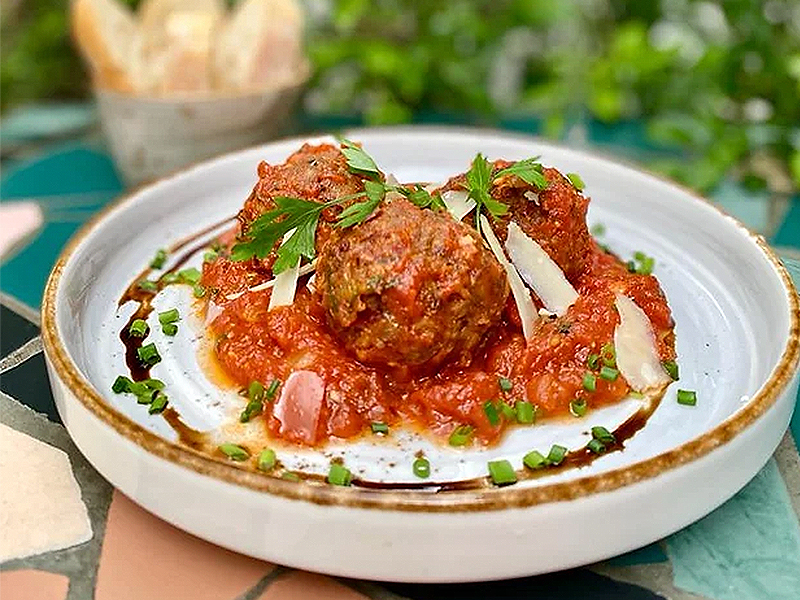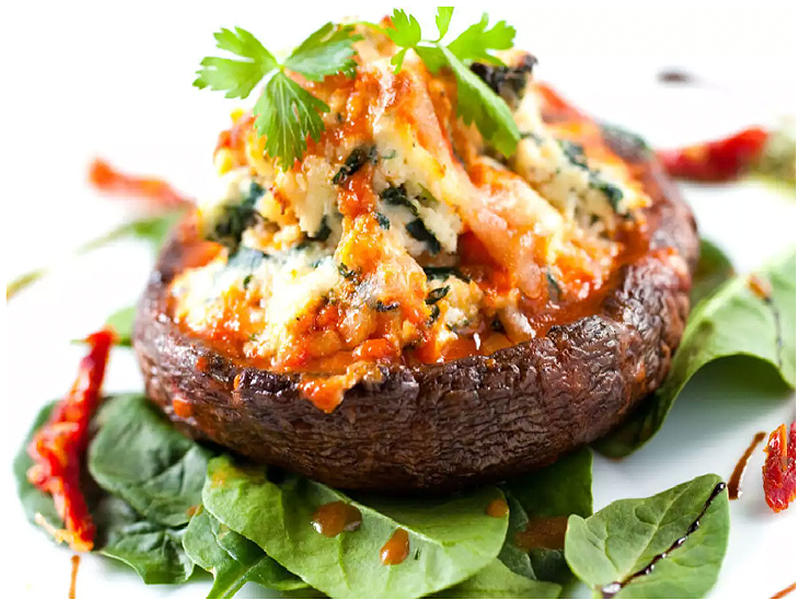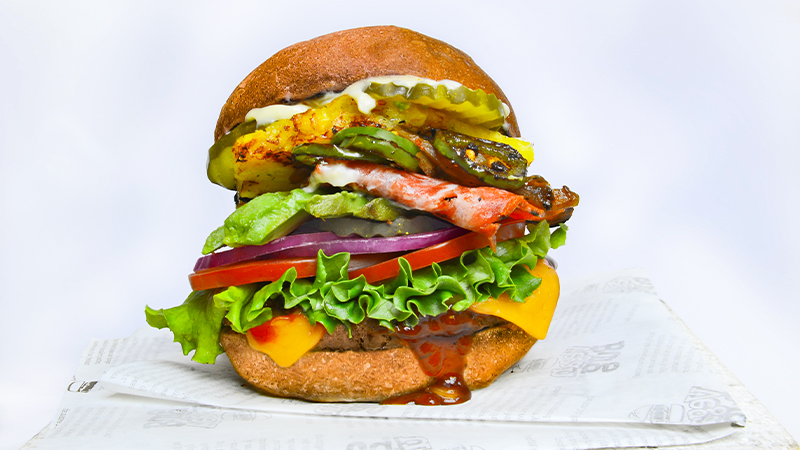The days of being served up an uninspiring salad and a plate of mushrooms when you request vegetarian food in Singapore are long gone. Whether your reasons for seeking out something vegan, organic or vegetarian (or any combination of these) are for health, animal welfare, religious reasons or the environment, there are plenty of vegan and vegetarian restaurants in Singapore – including amazing modern Indian food options!
We’ve checked out a range of places, from fine-dining organic food to local neighbourhood all-raw vegan dishes, where the chefs go to extra lengths to cater for the discerning foodie in search of healthier options. With such a selection of vegan and vegetarian restaurants in Singapore, it’s never been a better time to go meat-free! From hearty veggie burgers to ice cream, here are some great plant-based places to eat.
Best vegetarian restaurants in Singapore
Cultivate Cafe – gluten-free vegan and vegetarian food
This plant-based, GMO-free, gluten-free vegetarian and vegan restaurant specialises in flavourful dishes made from organic ingredients sourced locally and globally from small and family farms. Located in the Maxwell Reserve, Autograph Collection hotel, Cultivate has a warm ambience and showcases everything from freshly pressed organic juices to gluten-free breads and desserts.
Specialties include white asparagus with Turkish figs and Sicilian green olive dressing, dessert treats and dairy-free ice creams. You’ll also find interesting soups such as pear and leek, and roasted heirloom tomato and basil. Heartier dishes include vegan sandwiches, including one with roasted eggplant and avocado smoked plant-based mozzarella with sumac, red onion and mango chutney, and there’s also a rich selection of poke bowls and salads.
Meanwhile, Cultivate’s grab-and-go patisserie has delicious handmade delicacies to carry you through the day – from a morning croissant to an afternoon treat – and beautifully boxed celebratory cakes to pick up on the way. The baristas at this vegetarian restaurant here use the highest quality of beans to elevate the flavours, aromas and textures in their coffees – or choose from herb-laden smoothies and locally brewed kombucha.
2 Cook Street, Maxwell Reserve, Autograph Collection
8866 0159 (WhatsApp) | cultivatecafe.sg
Sexy Indian – vegetarian Indian restaurant in a boutique hotel
This vegetarian Indian restaurant ticks so many boxes for health-conscious diners with its plant-based, GMO-free and gluten-free menu – and in the most exquisite of settings. Housed in a vintage Art Deco building with interiors by Jacques Garcia, Sexy Indian forms part of The Vagabond Club, A Tribute Portfolio Hotel.
Perfect for a quick lunch or a casual dinner, this modern Indian restaurant prepares vegetarian Indian food from scratch using top-quality ingredients and inspired by the ancient Indian Ayurvedic ideal of purity.
Expect honest and wholesome food with a contemporary twist such as Papadum Tacos, Chef’s Special Sexy Curry and Thandai Panna Cotta. You’ll also find a cheeky selection of cocktails, coolers and signature hot drinks, with jazz music playing from 8.30pm, Thursday to Sunday.
The Vagabond Club, 39 Syed Alwi Road
8866 0896 (WhatsApp) | sexyindian.sg
Little Farms – vegetarian food in-store and at the café
Part café and part grocery store, Little Farms is popular for its fresh produce and all-natural grocery options (including its ever impressive avocados!). The café has a wide range of vegan and vegetarian food on the menu, with many of the dishes using ingredients from the grocery side – a big perk of having an endless supply of high-quality produce! A popular choice is the Spiced Cauliflower Salad with pomegranate, avocado, almonds, red cabbage, mint yoghurt, molasses and sumac spice.
There’s a range of vegan-friendly salads, too. The Farmer’s Salad and Heirloom Tomato Salad are loaded with fresh vegetables, while the Vegan Bowl is a hit for brunch lovers with portobello, kale, tempeh, beans, tomato, avocado and sourdough bread.
Stock up on vegan and vegetarian snacks in the grocery aisle on your way out!
Multiple locations islandwide
6385 7366 | littlefarmscafe.com
The Living Café – a long-running vegan restaurant in Bukit Timah
This café is another mainstay on Singapore’s raw vegan scene. The whole idea here is to fully maximise food’s vitamins and minerals by consuming them raw rather than compromising their health-promoting qualities through the cooking process. All dishes at this vegetarian restaurant are free of dairy, preservatives, artificial additives, refined sugars and red meat. While these guys do serve a small amount of white meat and fish, much of the menu is vegan. We suggest the avocado cucumber soup with chilli and lemon, and the taco boats with raw walnut “meat”, guacamole and mango salsa. For dessert, don’t miss the range of raw cheesecakes and chocolates.
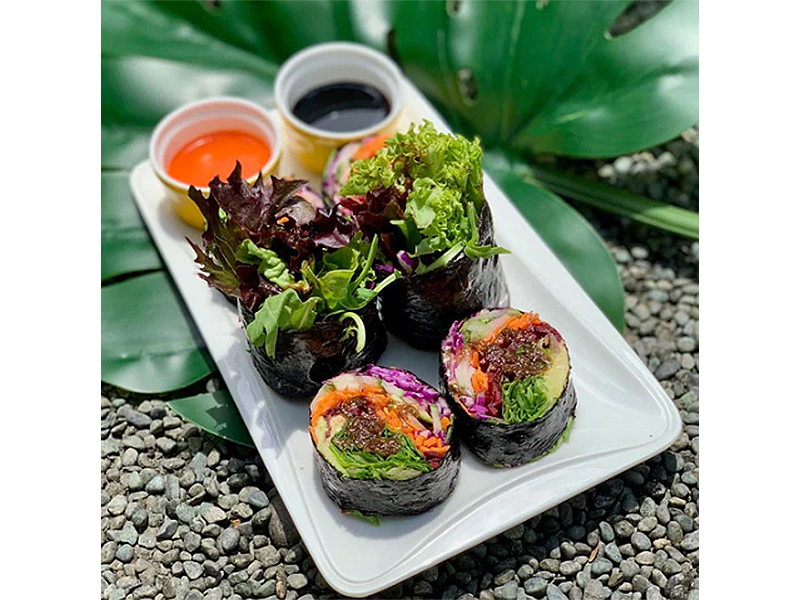
779 Bukit Timah Road
9735 9404 | thelivingcafe.com
Original Sin – popular vegetarian restaurant in Holland Village
This long-time favourite in Jalan Merah Saga is well known for its vegetarian Middle Eastern and Italian cuisine, and for good reason. Everything at this vegetarian restaurant is fantastic – from the mezze platter with hummus, pumpkin and carrot dip, beetroot and almond dip, falafel, tzatziki and pita, to the moussaka – baked layers of eggplant, potato, tomato and lentils with Middle Eastern spices. We also love the Principessa salad with pumpkin, avocado, asparagus, mushroom, French beans, bocconcini and balsamic, and – one of our personal favourites – the Kashmir pizza with bocconcini, mozzarella, hummus, onion, asparagus, tofu, cherry tomatoes and tandoori sauce. Yum!
#01-62 Chip Bee Gardens, 43 Jalan Merah Saga
6475 5605 | originalsin.com.sg
Pano Kato – vegan and vegetarian food in Tanglin Mall
Love Mediterranean cuisine? Check out this gorgeous diner, started by the same folks behind furniture and homeware store House of AnLi. Located on the second floor of Tanglin Mall, the bright and airy space is decked out in white and rattan furnishings, along with lovely green accents for a tropical touch. On top of the relaxed resort-like vibes, you can look forward to a wide selection of vegetarian dishes.
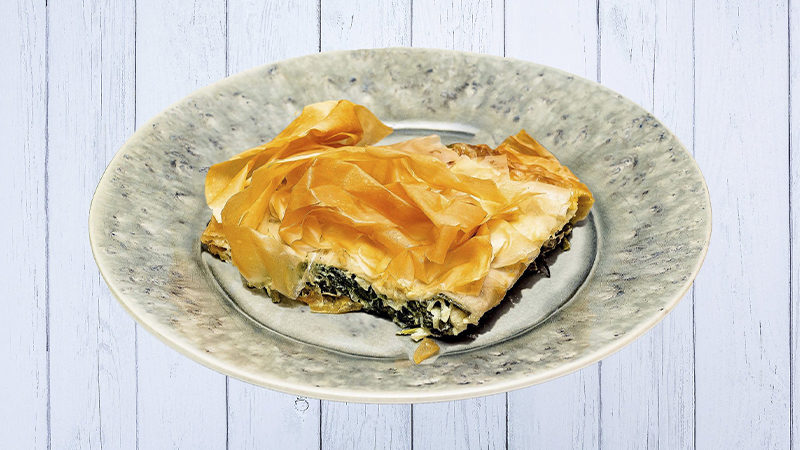
Out of the vegetarian food options, start with some delicious Greek dips and appetisers to share; popular items include grilled halloumi, the trio of dips with pita, and horiatiki, a classic Greek salad. Then, indulge in family recipes served straight from the oven; one favourite is spanakopita, a vegetarian dish of filo pastry with fresh spinach, feta, onion and eggs. Also on offer are healthy, meat-free wraps like the falafel wrap, which includes a vegan falafel, hummus, tomatoes and capsicum. If you’re still feeling hungry, the Impossible Bolognese or vegan pizza will definitely fill you up.
Whatever you do, don’t leave without trying the homemade desserts. We’ve heard rave reviews about the restaurant’s Greek baklava: layers of crispy filo, roasted pistachios and rosewater syrup, served with vanilla gelato and thyme honey.
#02-23 Tanglin Mall, 163 Tanglin Road
6593 0387 | houseofanli.com
Veganburg – tasty vegan burgers
Meat-free burgers can be tasty too! This is especially true at plant-based burger house Veganburg, where they come in flavours like char-grilled satay, featuring rich Asian peanut sauce drizzled over a grilled soy patty, and smoky barbecue, which comes with a delish mushroom patty. Go with a bun, or get your burger in a lettuce wrap instead. Visiting with friends? Order a side of creamy garlic fries or Shrooms Pops to share! Look out for the seasonal specials too. Past renditions include the mouth-watering Curry Dhal Burg, which featured a signature potato and spinach patty and slow-cooked curry dhal sauce.
44 Jalan Eunos
6844 6868 | veganburg.com
Tea Villa Café – a fusion vegetarian restaurant
Looking for vegetarian restaurants with variety? This café serves up a wide range of cuisines – from Indian, Mexican and Lebanese to Italian and Indian Chinese fusion – with vegan, gluten-free, and onion- and garlic-free options available as well. There’s really something for everyone, making it an easy go-to for meat-free meals and vegetarian food.
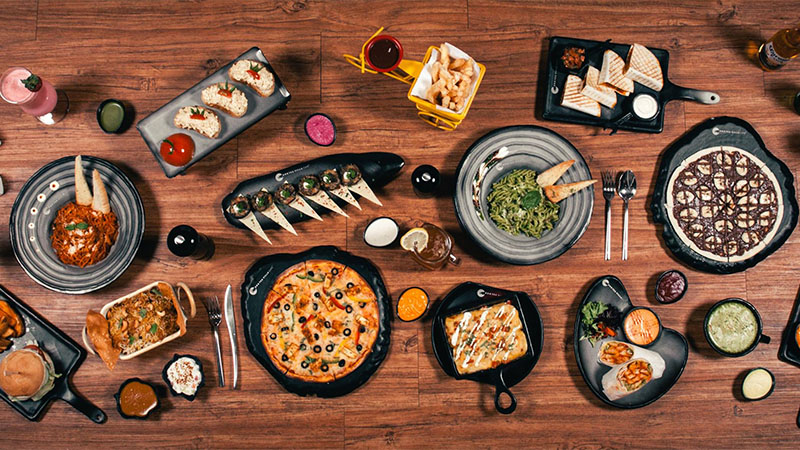
Whether you’re in the mood for pizza and pasta, tacos or garlic fried rice, the menu is vast, so there’s always something new to try. The French fries options alone are overwhelming (in a good way!) with six types to choose from, including a peri peri variety. We’re also really digging the dedicated page of eggless Belgian waffles – the 10 options include banana caramel, Nutella, Oreo and sizzling waffles with chocolate sauce. You’ll also find a selection of eggless cakes, ice cream and other desserts.
Aside from the delicious food, the restaurant’s got a selection of over 100 teas – everything from fruit to herbal to Indian milk teas with spices.
97 East Coast Road
8518 4250 | teavilla.sg
Whole Earth – Asian vegetarian food with Peranakan and Thai flavours
This Peranakan-Thai vegetarian restaurant in Tanjong Pagar is a firm favourite with those who work in or frequent the neighbourhood. Popular dishes include assam pedas vegetables (a sour and spicy Peranakan dish), addictive olive rice, and the bestseller Sambal King – okra, eggplant and long beans – to name a few.
76 Peck Seah Street
6221 6583 | wholeearth.com.sg
Daehwa – Korean plant-based vegetarian dishes
Like its sister restaurant, The Boneless Kitchen in Tai Seng, this eatery serves meatless Korean fusion cuisine using plant-based ingredients for vegetarian food; think kimchi soup, bulgogi mushroom stew, bibimbap made with tofu, and vegetable dumplings – yum!
#01-35 Galaxis Building, 1 Fusionopolis Place
6254 8446 | daehwavegetarian.com
Afterglow by Anglow – raw and cooked vegan dishes
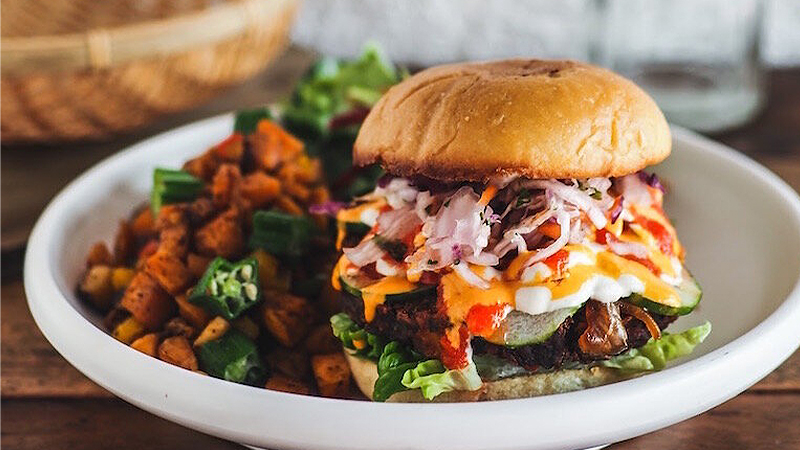
This cosy vegan café is one of the original vegan hotspots in town. Its healthy menu features a mix of raw and cooked dishes. Highlights include the raw lasagne – layers of zucchini sheets with walnut minced “meat”, cashew cream cheese, dehydrated cherry tomatoes and herb pesto – and the Cuban burger with a three-bean patty, flaxseed, purple cabbage slaw, tomato salsa and guacamole. The signature avocado kimchi rolls are great too! Dessert fans should definitely try the raw chocolate salted caramel fudge, made with avocado mousse, tahini layer, honey, pressed organic coconut oil, and a medjool date and walnut crust.
24 Keong Saik Road
6224 8921 | afterglow.sg
Project Açaí – vegetarian superfood!
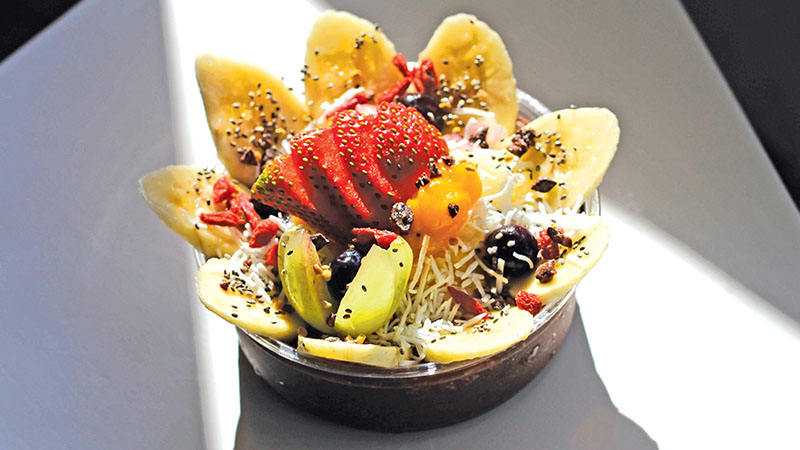
Health nuts with a sweet tooth will love this açaí superfood café, which offers low-sugar, gluten-free and vegan açaí bowls and smoothies, packed with flavour and antioxidants. Start with a blended Sambazon açaí base, and layer on all sorts of healthy toppings like fresh fruit, raw cocoa nibs, coconut shavings, goji berries, chia seeds, granola and bee pollen. Pronounced “ah-sigh-ee”, the superfood, which comes straight from the Amazon rainforest, is packed with antioxidants, fibre and omega 3, 6 and 9, and is known to help prevent heart disease and cancer, increase energy levels and also help delay signs of ageing.
Holland Village, VivoCity, Orchard, Lau Pa Sat and Katong
project-acai.com
Joie by Dozo – meatless dining on Orchard

Located on the rooftop garden at Orchard Central, Joie (“Joy”) by Dozo Restaurant offers modern meatless fine dining. Choose from an elaborate six-course lunch or seven-course set dinner consisting of contemporary dishes with Japanese-European flavours.
#12-01 Orchard Central, 181 Orchard Road
9663 0901 | joie.sg
Genesis Vegan Restaurant – dumplings and other vegetarian delights
You likely wouldn’t stumble upon this place, as it’s tucked deep inside the basement of a rather empty mall. But it’s worth seeking out if you’re looking for Western and Chinese specialties done in vegan form. Don’t miss ordering the dumplings – they’re delish! Other firm favourites include the “chicken” rice and also the Nyonya laksa.
Havelock II #B1-01, 2 Havelock Road
6438 7118 | facebook.com/genesisvegan
Real Food – vegetarian dishes for adults and kids alike
Apart from serving vegetarian dishes, Real Food makes a point of avoiding processed ingredients, artificial preservatives and trans fats. Fan favourites include the beet burger, steamed dumplings and spicy tom yam soup with tofu, eggplant, mushrooms and pineapple, to name a few. Meanwhile, for kids, there are mini sourdough pumpkin pancakes, crispy veggie nuggets and a mushroom burger.
Real Food can be found in Orchard Central and the Tzu Chi Humanistic Youth Centre.
realfoodgrocer.com
Elemen – a vegetarian restaurant chain
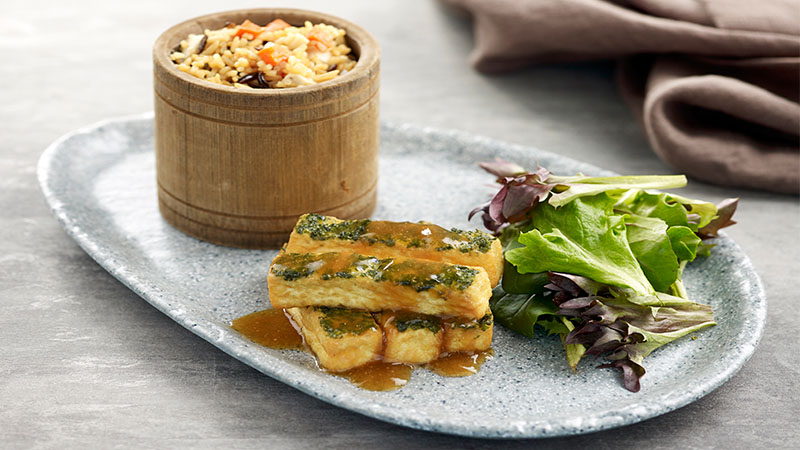
This veg restaurant chain offers a modern interpretation of meatless cuisine with Chinese, Japanese and Western influences from lasagne and quinoa salad to Asian curry with crispy roti and a wild mushroom and truffle pizza. Also, don’t miss the five-course set for $28.80, or the eight-course set for $33.80! There are outlets at HarbourFront Centre, Millenia Walk, Paya Lebar Quarter and Great World City, all offering a selection of Elemen’s most popular dishes.
Multiple locations islandwide
elemen.com.sg
NomVnom – burgers from a vegan restaurant chain
This vegan fast-food chain offers over 20 different vegan burgers with patties made from soy, tempeh, jackfruit, potato or vegetables; the Beetroot Hummus burger has a mushroom patty, for instance, and the Terrific Light burger is cauliflower-based. You’ll also find vegan soups, sides and a range of desserts including six- and eight-inch vegan cakes for purchase. If you can’t make it to their store locations, you can order online – they deliver island-wide!
NomVnom can be found in Tai Seng and Clarke Quay.
nomvnom.com
WellSmoocht – vegetarian ice cream for dessert lovers!

We’ll take ice cream any way it comes, including its vegan incarnation at WellSmoocht. Here, the ice cream is made from organic brown rice milk and evaporated cane juice. The shop serves flavours like hazelnut, Nutella, Earl Grey and French chocolate, mint, coconut and matcha, among others; you can also get them served on a waffle!
319 Jurong East Street 31, #01-58
wellsmoochtcollective.com
Sufood – Taiwanese vegetarian food in Singapore
Hailing from Taiwan, this vegetarian eatery offers a selection of pasta, pizza, rice and salad dishes. For lunch, there are four-course, six-course and eight-course set meals available, though you can order à la carte too. Popular picks include the five-grain rice with black truffles and mushrooms, avocado and macadamia salad, and wild mushroom charcoal tagliatelle.
#02-19 Raffles City Shopping Centre, 252 North Bridge Road
6333 5338 | sufood.com.sg
Teng Bespoke – a Japanese vegetarian restaurant
If you like Japanese food but want to go meatless, not to worry! This place serves vegan sashimi (prawn, salmon, squid, scallop and tuna) that looks just like the real thing. They’ve also got maki rolls to satisfy your sushi cravings, with the avocado maki considered a firm favourite. In addition, you’ll find salads, noodle dishes, hand rolls and more.
91 Bencoolen Street, #01-50
tengbespoke.com
Want more? Here are some other vegan food options and vegetarian restaurants in Singapore!
Herbivore Zen
This small café is a great option for Japanese food, serving the likes of udon and sushi, as well as bento sets and more. Dishes feature mock meat, from chicken and pork to mock unagi and salmon sashimi.
Fortune Centre #01-13/14, 190 Middle Road
6333 1612 | herbivore.sg
Gokul Vegetarian Restaurant
Here you can find the very best in North, South Indian and Asian vegetarian food. With over 100 food items from small bites like samosa chaat, dosa to mains like tom yum noodle, Hokkien noodles and paneer fried rice to Western and Asian salads, it can be quite overwhelming, but the more the merrier, we say. All the dishes contain no onion, garlic or egg.
19 Upper Dickson Road
6396 7769 | gokulvegetarianrestaurant.com
Nature Cafe
This vegetarian restaurant has two locations in Singapore (The Aperia at 12 Kallang Avenue, and 11 Jalan Bukit Merah), each serving up a wide variety of local, Asian and Western dishes; they’re also made without MSG, alcohol, onions or garlic.
LingZhi Vegetarian
From claypot dishes to steam-boat, Chinese favourites are made here from vegetables and also mock meat.
541 Orchard Road, Liat Towers
6734 3788 | lingzhivegetarian.com
Little Green Kitchen
Fancy going veggie at home? Then seek out Little Green Kitchen, an East Coast cookery school that teaches vegetarian recipes from India, Vietnam, Thailand and more.
1 Hacienda Grove, Upper East Coast Road
9763 1483 | littlegreenkitchen.com.sg
Vegetarian Indian restaurants in Singapore
Almost a third of Indians in India are vegetarian, so it’s no surprise that there are many vegetarian Indian restaurants in Singapore. These are some of our favourites.
MTR Singapore
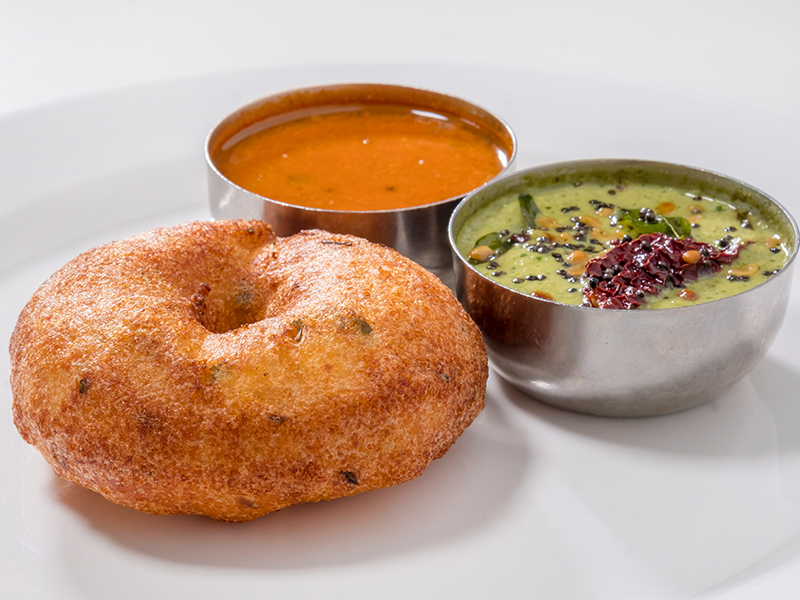
This award-winning restaurant in Singapore serves fresh and authentic South Indian vegetarian food, prepared without artificial enhancers, MSG, preservatives or additives. If you love spice, start with a serving of Pudi Idly, flavoured with spicy chutney, ghee, spices and coriander. An idly is a savoury snack of steamed rice cakes made with a batter of fermented black lentils and rice. Another must-try is the Uddina Vada, a savoury donut that’s also made from lentils. Served with sambar and chutney, the fritter is the perfect bite for any time of the day.
438 Serangoon Road
6296 5800 | mtrsingapore.com
ADDA – vegetarian Indian restaurant with a twist!
When it comes to vegetarian food, Indian cuisine has an endless array of options. ADDA Singapore, for example, features the best dishes that India has to offer, with a fun, contemporary twist and infusion of local flavours. Vegetarian starters include Claypot Portobello, Potli Samosas, and Bollywood Burger Sliders made with Tindle plant-based chicken. Want to stick to the classics? Pick the Vada Pav (a spiced potato patty burger), a soulful street food favourite.
For mains, you can choose from modern Indian creations like Butter Paneer Pot Pie, and Bok Choy and Cottage Cheese Kofta. Or stick with stalwarts like the Vegetarian Biryani Dum Pot and the Dariya Gunj Eggplant Bharta. To end things on a sweet note, try the Vegan Carrot Halwa – it’s a sticky, lightly spiced sweet that’s a favourite in India.
#01-201 Diners Club Building, 7500E Beach Road
8922 3679 | thespiceadda.com
Annalakshmi
While Little India is the epicentre of Indian vegetarian restaurants in Singapore, one of the city’s best is, surprisingly, in Downtown Gallery. Annalakshmi also has a most interesting concept: eat what you want, pay what you want. This Indian vegetarian restaurant in Singapore is staffed by volunteers and all donations go to charity. And the home-style curries, breads and rice dishes are excellent.
Downtown Gallery, 6A Shenton Way #03-26
6339 9993 | annalakshmi.sg
Ananda Bhavan
Ananda Bhavan is said to be the oldest of Singapore’s Indian vegetarian restaurants. There are now at least six branches, the one next to Mustafa’s being the most popular. Try the thosai set with accompanying curries and dhal.
Multiple locations islandwide
anandabhavan.com
Liked this article on the best vegan and vegetarian restaurants in Singapore? Visit our Wine & Dine section for more ideas and inspiration.

